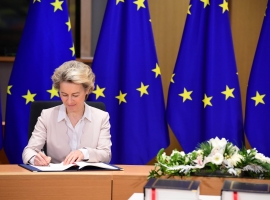
Big foreign investment banks face a tougher regulatory regime in the European Union under proposals made on Wednesday by the European Commission to bring them under the direct control of the European Central Bank, already the main regulator for top euro zone lenders.
Investment banks trade stocks, bonds, currencies and derivatives on behalf of customers, activities that have traditionally been supervised by market regulators rather than a central bank.
But the Commission is proposing to bring big investment banks with assets of over 30 billion euros under the tougher supervision faced by lenders who take deposits, while easing the regulatory burden on small investment firms, which account for the bulk of 6,000 investment firms currently authorised.
"The new rules will support well-functioning capital markets, while ensuring financial stability," European Commission Vice President Valdis Dombrovskis said in a statement.
"At the same time, larger firms posing similar risks as banks should be regulated and supervised like banks."
The big investment banks are largely concentrated in Britain, but are shifting parts of their operations to elsewhere in the EU in order to maintain links with customers there after the UK leaves the bloc in March 2019.
The ECB, which will be their new regulator, has been vocal in warning that foreign banks in London won't get away with setting up "letter box" or thinly staffed operations in the bloc.
The banks are hoping, however, to continue serving EU customers from London to some extent after Brexit.
The EU has existing powers to grant such market access to non-EU financial firms if their home rules are "equivalent" or as robust as the rules in force in the bloc.
It is a test solely in the gift of Brussels, and it looks set to become tougher.
"As the proposals change the prudential rules for investment firms, the equivalence test must also be adjusted to include these new rules," the European Comission said in a statement.
"It is proposed to set out in greater detail some of the requirements for equivalence."
Any equivalence assessment done by Brussels will have to be "very detailed and granular", it added.
To remain equivalent, a non-EU country like Britain after Brexit has to avoid diverging from the bloc's rules, which could turn Britain into a "rule taker", a step which some advocates for Brexit fiercely oppose.
Separately on Wednesday the BBC reported that the Bank of England would not force branches of EU banks in London to convert themselves into subsidiaries after Brexit, which would have been a costly undertaking.
The BoE announcement could help persuade Brussels to soften the plans it announced on Wednesday.
The proposals need the approval of EU states and the European Parliament, a process that will take many months and often results in changes. (Reuters)
Source: www.businessworld.ie

















